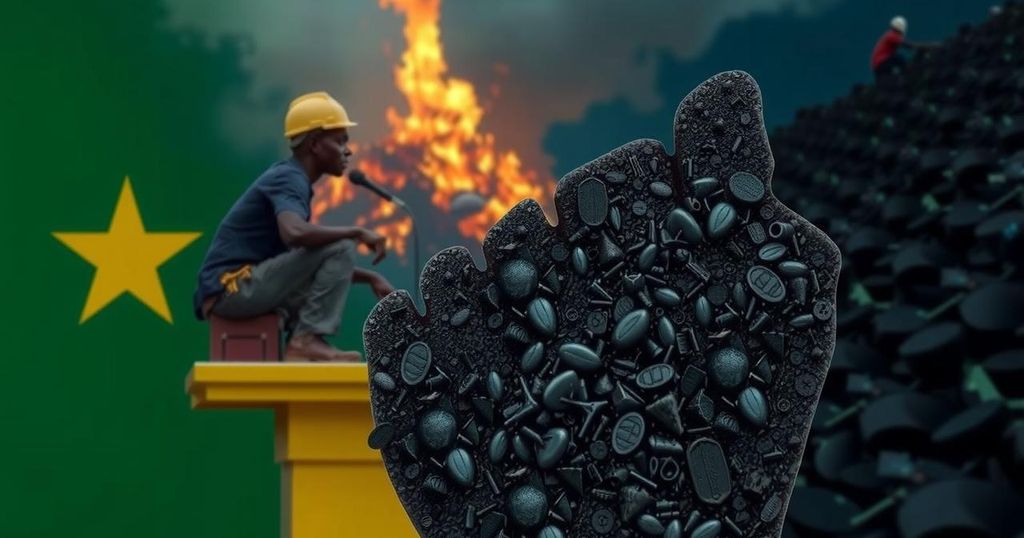Politics
ACCRA, AFP, AFRICA, ASHANTI, CIVIC ENGAGEMENT, CORRUPTION, DEMOCRACY, GHANA, GHANA WATER COMPANY LIMITED, IMMIGRATION, JOHN MAHAMA, LEADERSHIP, LEADERSHIP QUALITIES, MAHAMU, MAHAMUDU BAWUMIA, NANA AKUFO - ADDO, NATIONAL DEMOCRATIC CONGRESS, NDC, NEW PATRIOTIC PARTY, NPP, OSINO, WESTERN
Isaac Bennett
0 Comments
Ghana’s Presidential Election Reflects the Urgent Crisis of Illegal Mining
Ghana’s upcoming presidential elections are overshadowed by the illegal mining crisis known as “galamsey,” which has devastating environmental and economic repercussions. As miners like Frank seek survival, the ruling NPP and opposition NDC face scrutiny over their responses to this escalating problem, with public protests demonstrating the urgency for sustainable solutions. The elections represent a pivotal moment for addressing the pressing challenges posed by illegal mining, calling for comprehensive stakeholder engagement and accountability from political leaders.
In Ghana, the surge of illegal mining, locally referred to as “galamsey,” underscores a critical issue as the nation prepares for its presidential elections. Local miners, like Frank, engage in perilous work in search of gold, often employing rudimentary techniques that significantly compromise the environment. This crisis manifests visibly around Accra, where numerous laborers toil under harsh conditions with little regard for the land they exploit, which is evidenced by the destruction of arable land and pollution of water bodies, negatively impacting communities and the economy.
The illegal mining boom coincides with a pivotal election where Vice President Mahamudu Bawumia represents the ruling New Patriotic Party (NPP), while former President John Mahama leads the opposition National Democratic Congress (NDC). Both candidates face scrutiny regarding their plans to address the galamsey challenges, with previous government assurances failing to stem the tide of illegal mining activities that have exacerbated environmental degradation. Many miners, motivated by dire economic conditions and unemployment, earn a scant income compared to typical job prospects, thus complicating the crisis.
Amid rising gold prices, frustrations grow as the government is perceived to prioritize military crackdowns over sustainable solutions and job creation. The impact on agriculture, particularly on cocoa farms, is alarming; loss of fertile land and contamination of water sources threaten the livelihoods of many Ghanaians. Protests advocating for immediate governmental measures have gained traction, revealing deep-seated skepticism towards political commitments to rectify the situation.
Authorities have intermittently launched operations to curb illegal mining, but critics argue that these efforts lack coherence and consistency. The environmental toll is severe, with many citing a significant loss of natural resources and a contribution of illegal mining to a substantial portion of Ghana’s gold production. The current electoral climate serves as a potential catalyst for political action, emphasizing the need for genuine engagement among all stakeholders to foster solutions that balance economic needs with environmental preservation.
The phenomenon of illegal mining in Ghana, particularly the practice known as “galamsey,” has escalated into a significant crisis affecting both the environment and the economy. As Ghana stands as a leading exporter of gold and a major cocoa producer, the repercussions of unregulated mining threaten these essential industries. The government’s inability to effectively manage this sector has resulted in widespread ecological damage, degradation of farmland, and heightened public concern, particularly as the nation approaches a presidential election. The social and economic ramifications of illegal mining are profound, raising questions about job creation, environmental sustainability, and the efficacy of governmental policies in addressing these pressing issues.
In conclusion, Ghana’s illegal mining crisis poses severe challenges as the country heads to the polls. The interplay of economic necessity, environmental degradation, and political accountability is critical for fostering a sustainable future. The next government will need to navigate these complexities to secure not only the welfare of the miners but also the health of Ghana’s natural resources. Effective stakeholder engagement and a commitment to long-term solutions will be essential in reversing the detrimental impacts of galamsey.
Original Source: www.france24.com




Post Comment